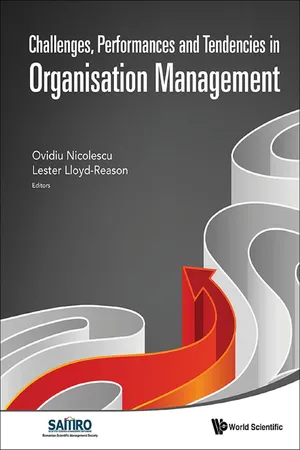
Challenges, Performances And Tendencies In Organisation Management
- 444 pages
- English
- ePUB (mobile friendly)
- Available on iOS & Android
Challenges, Performances And Tendencies In Organisation Management
About This Book
The field of management is, without a doubt, one of the most important and fastest changing fields in today's society. There is not any organisational structure — families, enterprises, towns, industries, countries, for example — which performs well without good management. For this reason, many resources are allocated to improve the management in the largest companies and also to management research/education and training.
In the transition to the knowledge-based economy of today, the "smart economy", management faces new challenges and opportunities. Challenges, Opportunities and Tendencies in Organisation Management is an invaluable volume that seeks to deal with the myriad of issues facing management today. It presents the scientific research of the most renowned management specialists from universities, companies, consultancy firms and research organisations from Romania and other parts of the world, who participated in the First International Management Conference organised by the Romanian Scientific Management Society (RSMS) in June 2014.
The book covers a variety of management fields, namely international management and cultural diversity; sustainable development and business sustainability; university governance and management; knowledge-based organisation, intellectual capital, information and management; entrepreneurship, social enterprise and SMEs; and leadership and human resource management.
It seeks to synthesise the latest and most innovative developments in management theory and praxis, in the context of the transition to the knowledge-based economy. It is useful for management professors, consultants, trainers and students, management professionals and those working in public administration. It will be of particular benefit to those who are interested in the evolution of management in the past few years in Europe, especially in Central and Eastern Europe.
The field of management is, without a doubt, one of the most important and fastest changing fields in today's society. There is not any organisational structure — families, enterprises, towns, industries, countries, for example — which performs well without good management. For this reason, many resources are allocated to improve the management in the largest companies and also to management research/education and training.
In the transition to the knowledge-based economy of today, the "smart economy", management faces new challenges and opportunities. Challenges, Opportunities and Tendencies in Organisation Management is an invaluable volume that seeks to deal with the myriad of issues facing management today. It presents the scientific research of the most renowned management specialists from universities, companies, consultancy firms and research organisations from Romania and other parts of the world, who participated in the First International Management Conference organised by the Romanian Scientific Management Society (RSMS) in June 2014.
The book covers a variety of management fields, namely international management and cultural diversity; sustainable development and business sustainability; university governance and management; knowledge-based organisation, intellectual capital, information and management; entrepreneurship, social enterprise and SMEs; and leadership and human resource management.
It seeks to synthesise the latest and most innovative developments in management theory and praxis, in the context of the transition to the knowledge-based economy. It is useful for management professors, consultants, trainers and students, management professionals and those working in public administration. It will be of particular benefit to those who are interested in the evolution of management in the past few years in Europe, especially in Central and Eastern Europe.
Readership: Students and professionals (professors, specialists, consultants, researchers) in the field of management.
Key Features:
- The authors of the research presented in the book are management specialists and experts who are internationally renowned for their research work in this field
- The book covers a highly varied range of management topics, structured in 9 sections, covering both micro and macro levels of modern management theories and practices
Frequently asked questions
Information
Part I
International Management and Cultural Diversity
Chapter 1
The Role of Large Corporate Boards in the Context of Globalization and Smart Economy: Creating Value for All Stakeholders
1. Introduction
1.1. The complex socio-economic context and more demanding stakeholders’ environment
1.2. Adopting new technology and innovating
1.3. People changes and challenges
2. OMV Petrom Case Topics
2.1. Context: The evolution of Petrom with a strong impact on the Romanian transition economy

Table of contents
- Cover page
- Title page
- Copyright page
- Contents
- Foreword
- About the Editor
- Part I. International Management and Cultural Diversity
- Part II. Sustainable Development and Business Sustainability
- Part III. University Governance and Management
- Part IV. Knowledge-Based Organization, Intellectual Capital, Information, and Management Documents
- Part V. Entrepreneurship, Social Enterprise, and SMEs
- Part VI. Leadership and Human Resources Management
- Part VII. Management of Change, Innovation, and Quality
- Index